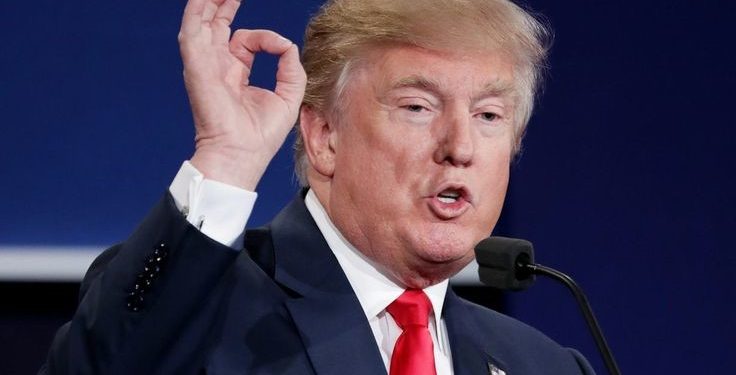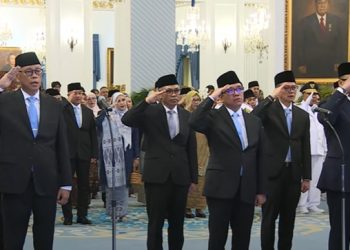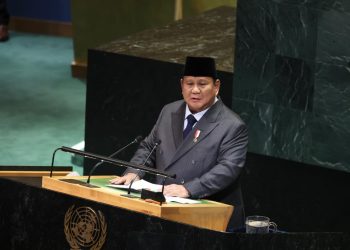Jakarta, Indonesia Sentinel — President Donald Trump, on Monday (January 20, 2025), repealed a series of executive orders promoting diversity, equity, and inclusion (DEI) and advancing rights for LGBTQ+ individuals and racial minorities. The move aligns with Trump’s campaign promises to scale back protections for marginalized groups.
As part of the announcement, Trump stated that the U.S. government would formally recognize only two sexes—male and female—and terminate DEI initiatives across federal agencies. Trump and his conservative allies have criticized DEI programs in recent years, labeling them as divisive and discriminatory.
According to Reuters, shortly after taking office, Donald Trump rescinded 78 executive orders signed by his predecessor, Joe Biden. Among these were at least a dozen measures aimed at addressing racial inequities and protecting the rights of gay and transgender individuals. This shift marks a sharp contrast to Biden’s administration, which had placed a strong emphasis on fostering diversity within the federal government.
Trump overturned two prominent orders that Biden had enacted on his first day in office. One order sought to advance racial equity for underserved communities, while the other aimed to combat discrimination based on gender identity or sexual orientation. Additional repeals targeted initiatives supporting Black, Hispanic, Native American, Asian American, and Pacific Islander communities.
In his inaugural address on Monday, Donald Trump framed his approach as an effort to combat “social engineering” based on race and gender in public and private sectors. He called for a society that is “colorblind and merit-based.”
A senior White House official indicated that the Trump administration plans to introduce additional executive actions in the coming weeks. These include reviewing and potentially ending what the administration describes as “discriminatory programs,” such as environmental justice grants and diversity training.
Policy Shift on Gender and DEI Programs
The new orders signed by Donald Trump stipulate that federal funds cannot be used to promote “gender ideology,” a term frequently employed by conservative groups to oppose non-traditional perspectives on sex and gender.
Under this policy, federal funding for gender transition medical procedures will also be prohibited, although specific details remain unclear.
The administration’s policy also restricts recognition of gender identity beyond biological sex, mandating that federal employers refer to “sex” rather than “gender” in official communications. The State Department and Department of Homeland Security have been directed to ensure that government documents, including passports and visas, reflect “sex accurately.”
The Biden administration had previously allowed U.S. citizens to select a gender-neutral “X” marker on passports, a policy the Trump administration is expected to reverse.
Response from Human Rights Advocates
Civil rights and LGBTQ+ advocacy groups have vowed to resist Trump’s agenda and defend the rights of marginalized communities.
“We refuse to back down or be intimidated. We are not going anywhere, and we will fight back against these harmful provisions with everything we’ve got,” Kelley Robinson, president of the Human Rights Campaign, the largest LGBTQ+ advocacy organization in the U.S., stated in response to Trump’s proposals, as reported by Reuters.
Advocates argue that any rollbacks to DEI initiatives or transgender rights would represent a significant setback to the progress made in combating systemic prejudices and achieving equitable policies for marginalized groups. They warn that such measures could erase decades of efforts aimed at creating equal opportunities for all.
Trump and LGBTQ+ Rights
President Donald Trump stance on LGBTQ+ rights, particularly his focus on transgender Americans, has been a consistent feature of his political agenda.
During his first term, Trump implemented several policies that rolled back protections for the LGBTQ+ community. Notably, he announced a ban on transgender individuals serving in the military and froze recruitment of transgender personnel. President Joe Biden reversed this policy upon taking office in 2021.
Read also : Trump Ambitions to Buy Greenland, What’s The Reason?
In the recent election season, many Republican candidates campaigned on overturning transgender-inclusive laws, with a particular emphasis on barring transgender women from participating in sports. Trump has pledged to prioritize what he terms the “transgender issue” on his first day back in office.
His proposed measures include banning transgender athletes from competing in women’s sports and halting healthcare services specifically designed for transgender individuals.
(Raidi/Agung)


























